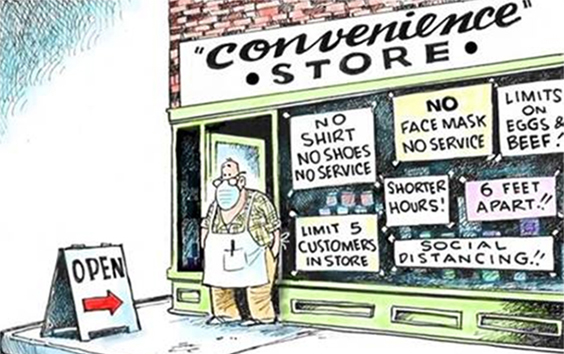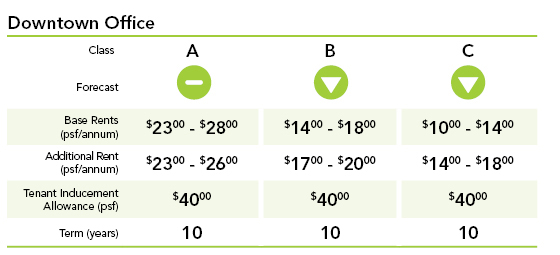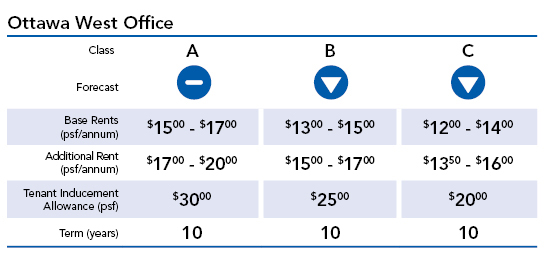
The general focus in the business community is shifting from damage control, to planning to get back into the office (in some format). In response, we wanted to provide this brief update on Ottawa’s commercial leasing conditions, and share our thoughts on how tenants may want to consider future uncertainty in the commercial real estate market as a means to secure leasing arrangements that will provide financial and non-financial business advantages.
Thus far, the broader economy has largely been in operating in a form of limbo, with no consistent predictions for how things will look in 6-12-18 months time. Therefore, we are not suggesting that tenants derail ongoing negotiations with the expectation of fire-sales within the next two years. Instead, we are suggesting that some recalibration may be possible.
Because commercial leases are generally 5, 10, or 15 years long, the shedding of space in economic downturns usually happens gradually as leases expire following major economic events. For example, the tech bubble of 2001 resulted in a peak vacancy rate in Kanata between 2002 – 2006. The financial crisis of 2008 and the subsequent bankruptcy of Nortel in 2009 resulted in a peak vacancy in Ottawa between 2012 -2016.
If the economy goes into a protracted downturn, we expect the impact of the COVID crisis on commercial office leasing in Ottawa to follow a similar trajectory, with vacancies and soft demand starting to show up in the early-mid 2020’s. Although material increases to vacancy rates generally result in a flattening (or lowering) of rents, it is the general anticipation of a downturn that will create opportunity for smart and strategic tenants to make improvements to the business and legal terms of their leasing arrangements in advance of the market statistics changing.
Office Markets
We expect that office landlords will not be as bruised as their retail and industrial counterparts. This is because most office tenants are continuing to pay their rent – most as per normal and some (mainly smaller tenants) with the landlord-provided benefit of several months of deferred rent. However, landlords will still receive most of their rent one way or the other. Nonetheless, this crisis is causing landlords to rethink which type of tenants they should ideally search for in the future, and thus be prepared to make additional concessions to obtain. We believe office tenants who are established and with good financial track records will make for the highest priority on landlord’s future prospect lists.
Retail + Industrial Markets
We expect that retail and industrial markets will be impacted significantly, and almost immediately. A large percentage of businesses in these sectors will not weather the storm. Although statistics vary, it is widely understood that 60 – 80% of retail tenants and 30 – 50% of industrial tenants are not paying rent at the present time. Of the businesses in these sectors not paying rent, some will recover, and many will not. Landlords of older mid-low ceiling height industrial property (i.e. not suitable as distribution centres) and landlords of retail centres will have to double their efforts to attract and retain tenants in the near future.
What Does This Mean for Businesses Who Lease Space?
We predict several opportunities for tenants who have a creative and longer-term view of their corporate real estate strategy:
- Spaces which were never initially intended to be office space may come available in the near foreseeable future. Think of large box stores at shopping centres, entertainment centres, industrial/flex properties, etc. Many of these properties offer unique and differentiating features which may be appealing to businesses and organizations that are willing to think creatively about their office space. Imagine having your office integrated into a shopping mall with a food court, gym, and numerous retail amenities at your doorstep?
- Tenants with a solid covenant and/or good business plan will be offered lower rents and larger inducements versus what would have been available in February 2020. Landlords who have been dealing mainly with rent abatement requests will most likely welcome the opportunity to secure leasing arrangements that will provide stability through the next 5 – 10 years.
- Tenants who are mid-way through a lease may wish to consider early-renewal negotiations, providing landlords with additional term in exchange for favourable rents and funds to modify/improve their office spaces and/or potentially purchase furniture and new equipment for the post-covid reality. These early-renewal negotiations can very much present a win-win, where a tenant can improve its existing lease and a landlord can secure a good long-term tenant relationship as a bridge through uncertain times.
In Conclusion
We encourage any business leasing space to take the time to think beyond the preparation of their physical workspace for the return-to-work. Corporate real estate is a significant line item in the budget of most businesses and organizations, and as much as the current crisis may have presented a litany of immediate challenges, thinking strategically about how to maximize the value of leased space will pay dividends in the future.
Forecasting for 2021






Don’t hesitate to reach out to us for resources to assist in developing your workplace strategy moving forward.
The Proveras Team
It is too early for market statistics to show the impact that the emergency measures have had on our commercial leasing market. However, we will be tracking this situation and will provide a subsequent report including statistics in a few weeks time.
